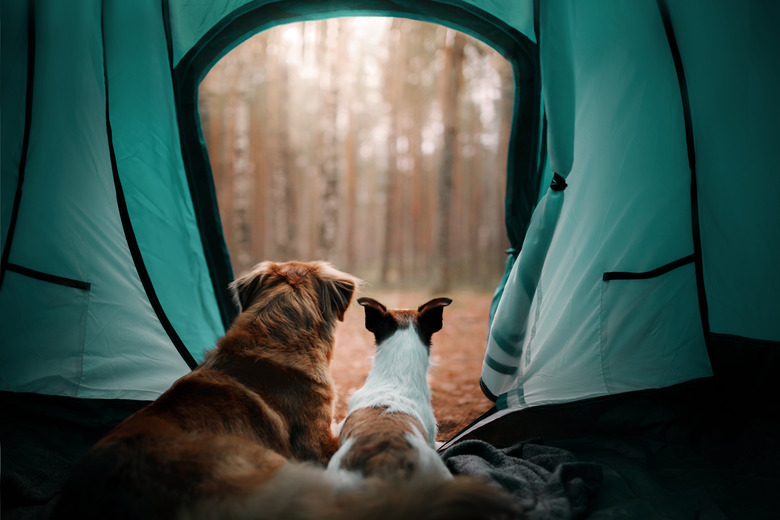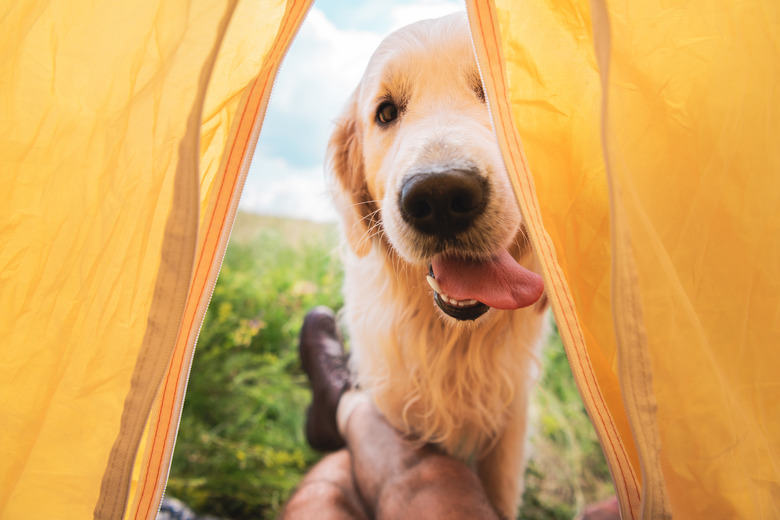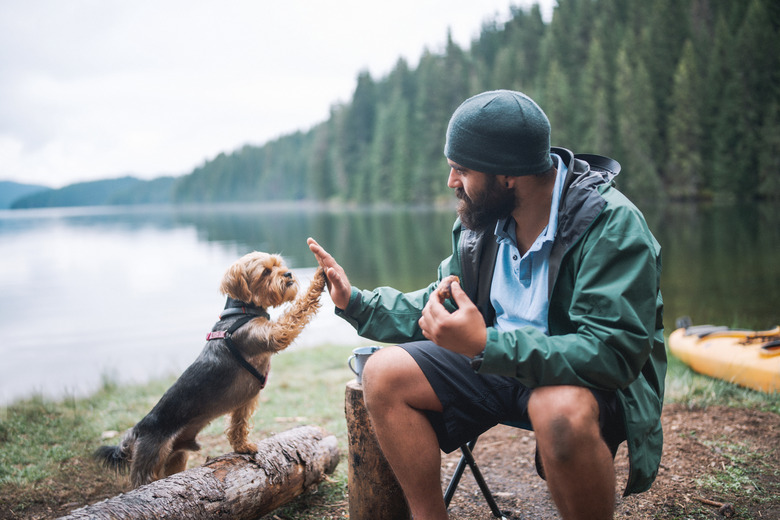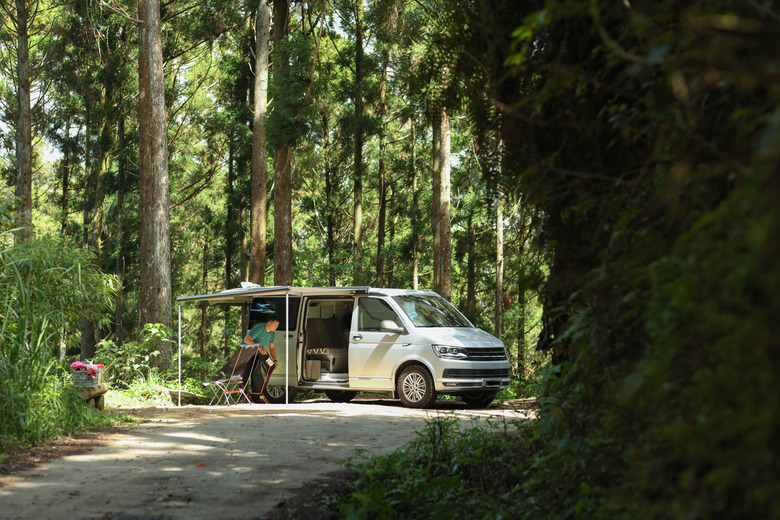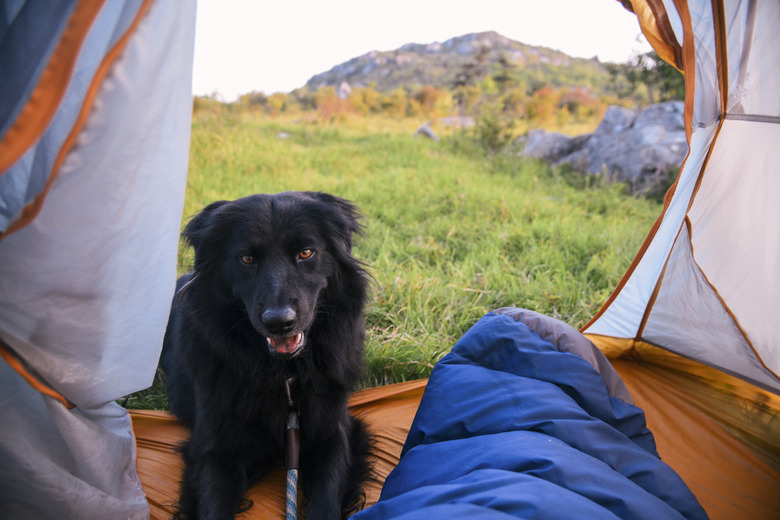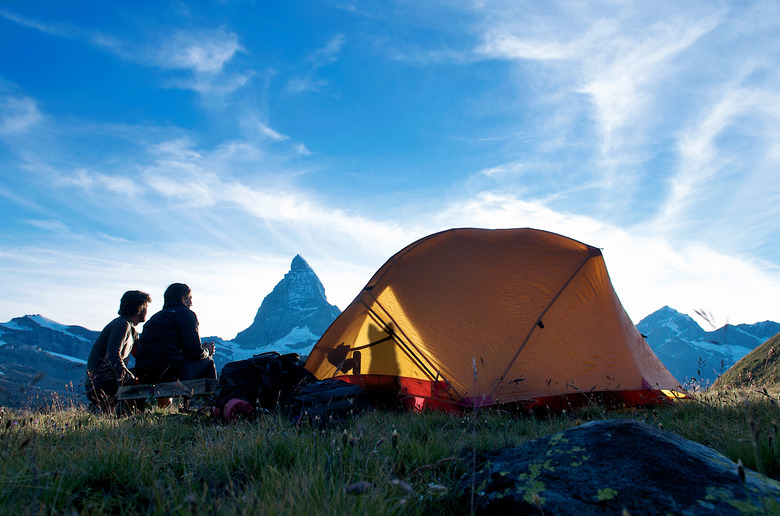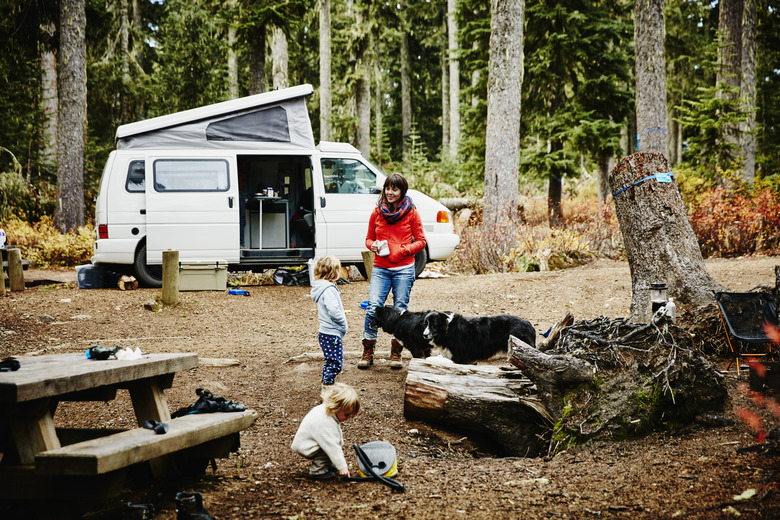7 Crucial Safety Tips For Going Camping With Your Dog
Looking to spend more time outside with your dog? Consider a camping trip! Hiking, swimming, or just relaxing around the campsite are enjoyable ways to spend quality time with your dog. Although camping is fun, it can be stressful to bring your dog outside their normal environment. Having all the supplies ready can help make your camping trip more enjoyable for you and your dogs. Before heading out to your favorite campground with your dog there are safety tips.
1. Keep identification on
1. Keep identification on
When going camping with your dog, you'll want to be sure your dog is wearing a dog collar with updated ID tags. Be sure that the phone number on your dog's tags includes a cell phone number that you'll have with you. Or, if you'll be camping somewhere without cell reception, add a tag with a phone number of a trusted friend or family member who will be available to answer the phone in case your dog gets lost while camping.
It's also a good idea to have your dog microchipped before going camping if you haven't done so already. Microchips are permanent identification your veterinarian can quickly and painlessly implant in your dog, so your dog will be identifiable even if they slip out of their collar. Before heading out camping just make sure that your contact information with the microchip company has been updated.
2. Prioritize health first
2. Prioritize health first
Before going camping with your dog, it's a good idea to make sure they are healthy and prepared for the activities you'll be doing. This is especially important if you're going to be hiking a lot on the trip, or doing other strenuous activities.
Before going camping, check to make sure your dog is up to date on all their vaccines. Your veterinarian may also recommend additional vaccinations including Lepto depending on where you'll be camping. You should also make sure that your dog is up to date on heartworm, flea and tick preventative medications. If you're camping in an area where ticks are prevalent be prepared to check your dog daily while camping, and remove any ticks you find.
3. Research locations ahead of time
3. Research locations ahead of time
Thankfully there are many pet-friendly campgrounds where people can enjoy outdoor adventures with their four-legged friends. However, not all campgrounds are dog friendly. Before heading out camping with your dog you'll want to check that the campground you are planning to stay at has dog-friendly campsites available for you to stay in. You will also want to confirm that any hikes or activities you are planning are in locations that are dog friendly, so you can make other plans if the trails you planned to explore don't welcome dogs.
For example, while many National Parks are dog friendly, many don't allow dogs on the hiking trails. When you arrive at your campground, familiarize yourself with pet policies for dogs, like what areas of the campground where dogs are allowed, and areas where they may not be allowed to accompany you like bathrooms, showers, and some swim areas.
4. Bring all necessary supplies
4. Bring all necessary supplies
When packing up to go camping, be sure to bring all your dog's camping gear. You will want to bring enough dog food for the length of your stay, as well as portable dog bowls and water bowls. If your dog has a sensitive stomach and you have room you may it's helpful to bring water from home for your dog. Be sure to pack a dog first aid kit with all the supplies you might need like tweezers, bandages, and medications to help treat your dog if they were to be injured while camping.
You'll also want to bring a harness, dog leash, long line for giving your dog more space to run and play as appropriate, and a properly fitted dog life jacket if you're going to be boating or playing in and near the water. Be sure to also pack plenty of poop bags for cleaning up after your dog, as well as an extra sleeping bag, or dog beds for your dog to sleep in your tent and around your campsite.
While camping, you'll want to bring lots of training treats for rewarding your dog for good behavior while camping, and it's also a good idea to bring booties to keep your dog safe if it's very hot or if you'll be hiking in areas with sharp rocks which could injure your dog's paws. You may also want to bring dog-safe bug repellent, and pack a coyote vest to protect your dog if there are coyotes in the area. Of course, don't forget to bring some of your dog's favorite toys, as well as any daily medications that your dog takes. If your dog takes daily medication check with your dog's veterinarian or pharmacy if any of those medications need to be stored in temperature-controlled ways.
5. Keep your dog leashed
5. Keep your dog leashed
While camping you're going to want to keep your dog leashed at all times. For going camping with your dog, it can be useful to bring a hands-free leash or sturdy tether to be used only while supervised. This can be useful as you'll be able to use your hands to set up camp, and for general camping safety like keeping your dog away from campfires and other hazards. Most campgrounds require dogs to be leashed and it's important to always follow these leash rules to keep campgrounds welcoming to dogs. In addition, keeping your dog leashed will prevent your dog from rudely approaching other campers or dogs, or chasing wildlife.
6. Watch weather
6. Watch weather
Before going camping, and while you are camping keep an eye on the weather and weather conditions. To avoid heat-related illness, you'll want to limit how much time your dog is spending outside in the heat, especially if they are playing or hiking. Sticking to the shade, cool water, and portable fans can help keep your dog cooler during hot parts of the day. If weather conditions become more severe than anticipated, you may need to consider ending your camping trip early for your dog's comfort and safety.
7. Use caution around wildlife
7. Use caution around wildlife
Camping is a fun way to enjoy nature with your dog, but our dogs aren't the only animals out in nature. When camping with your dog, be respectful of wild animals. Keep your dog leashed and don't allow your dog to chase, stalk, lunge, or harass wildlife. Not only is that behavior rude, but it also can lead to your dog getting injured. Depending on your location, hawks (for small dogs), as well as porcupines, skunk, bears, coyotes, cougars, and other wildlife native to the area can pose serious safety risks for your dog.
Be sure to clean up after your campsite including any dog food or treats to avoid attracting wild animals to your campground. To help protect your dog, keep your dog supervised at all times to make sure wildlife isn't approaching your dog. In addition to supervision, protective gear like coyote vets can help keep your dog safer. Remember, while you and your dog are camping you're in the home of the wildlife so be respectful and keep your distance.
